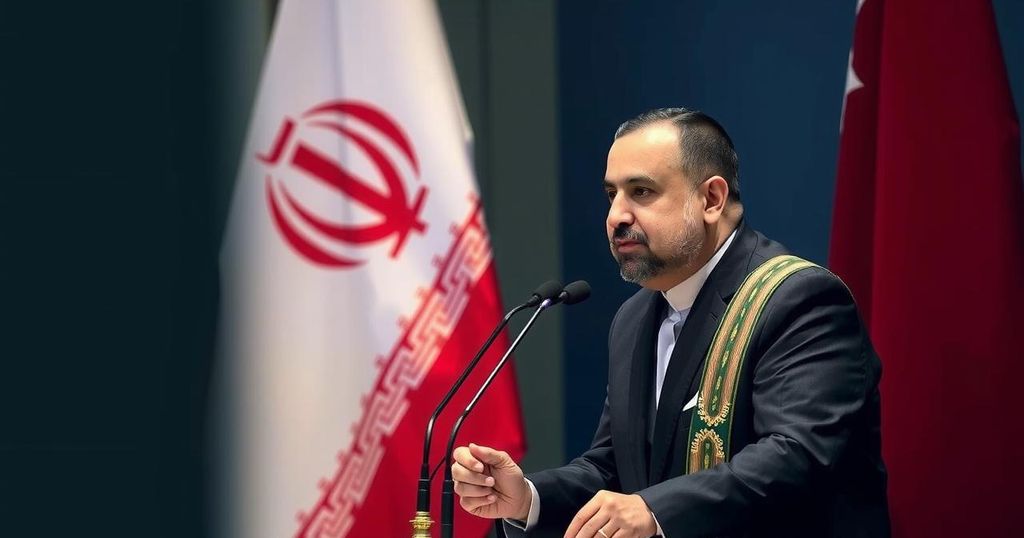Iran’s Foreign Minister Abbas Araghchi met with Qatari and Russian officials to strengthen bilateral ties amid rising regional tensions. These meetings reflect Iran’s strategy to collaborate with Qatar, a U.S. ally, and Russia, amidst geopolitical challenges influenced by the conflict in Ukraine and Western sanctions. Iran aims to enhance its influence while addressing issues such as support for Hamas and ongoing international scrutiny.
Iranian Foreign Minister Abbas Araghchi has engaged in discussions with both Qatari and Russian counterparts in efforts to solidify alliances. The meetings underscore Iran’s strategic positioning within the geopolitical landscape while working with Qatar, a U.S. ally—highlighting enduring ties between Iran and Qatar, which have historically collaborated on various regional issues including their support for opposing factions in conflicts such as those in Israel and Lebanon. Concurrently, Iran is enhancing its relationship with Russia, as evidenced by recent military and economic affiliations, particularly in the context of shared interests against Western sanctions. The meeting with Qatari Foreign Minister Sheikh Mohammed bin Abdulrahman Al Thani serves to affirm bilateral cooperation amidst rising tensions in the region. Reports indicate concerns regarding U.S. pressure on Qatar to limit its support for groups such as Hamas, which Iran supports. Araghchi has expressed a desire for coordination on significant regional agendas, including potential ceasefire discussions in Lebanon, amidst ongoing diplomatic negotiations involving U.S. envoy Amos Hochstein. Furthermore, Araghchi’s discussions with Mikhail Bogdanov, the Russian President’s Special Representative, emphasize Tehran’s commitment to enhancing Russian-Iranian relations, particularly in light of increasing collaboration on military endeavors, notably the supply of Iranian drones to Russia for use in Ukraine. These engagements reflect Iran’s concerted effort to position itself as a counterweight to Western influence, leveraging its alliances with Russia and Qatar to fortify its geopolitical presence in an increasingly polarized global arena. Despite rising tensions in Ukraine and an escalation of military activities, Iranian officials maintain that their relationships are designed to counteract perceived aggressions from Western nations, specifically criticizing the European Union’s sanctions targeting Iranian industries. Araghchi’s recent communications with the International Atomic Energy Agency (IAEA) underscore ongoing Iranian concerns regarding international perceptions of its activities amidst external pressures and accusations.
The article presents an analysis of Iran’s recent diplomatic engagements with Qatar and Russia, illustrating Tehran’s strategic maneuvers in a complex geopolitical environment. Iran’s diplomatic relations, particularly with Qatar—despite its alignment with the United States—and Russia—known for its military collaboration—indicate a nuanced approach to regional power dynamics. The backdrop also includes rising tensions surrounding the conflict in Ukraine, as Iran finds opportunities to bolster its own international standing while addressing challenges posed by Western sanctions. This duality showcases Tehran’s intention to navigate its relationships with both Qatar and Russia effectively while pursuing its regional interests.
In summary, the recent meetings involving Iranian Foreign Minister Abbas Araghchi underline Iran’s strategic realignment within the regional and global political landscape. By fostering ties with Qatar and deepening cooperation with Russia, Iran seeks to enhance its influence amidst geopolitical tensions, particularly in light of the ongoing conflict in Ukraine and counteraction against Western sanctions. Through this diplomatic orchestration, Iran aims to solidify its position regarding various regional crises while advocating for its interests on the international stage.
Original Source: www.jpost.com






